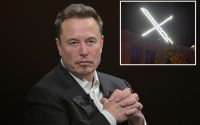‘We can achieve great things’
We might be welcoming our robot overlords in the near future.
As if artificial intelligence wasn’t taking enough jobs of late, now AI is suggesting they could potentially be president.
A panel of braggadocious AI-powered humanoid bots boasted that they were better equipped to run the world than humans at a United Nations summit on Friday.
“Humanoid robots have the potential to lead with a greater level of efficiency and effectiveness than human leaders,” boasted Sophia, Hanson Robotics’ “most advanced human-like“ bot and the first robot innovation ambassador for the UN Development Program, Yahoo News reported.
The advanced automaton made the inflammatory statement at the UN’s two-day AI for Good Global Summit in Geneva, Switzerland, NBC Washington reported.

The summit saw some of the world’s reportedly most powerful AI-powered bots — including healthcare bot Grace and rock-star robot Desdemona — join 3,000 human experts to discuss how best to harness AI to solve the world’s looming, seemingly intractable problems, ranging from hunger to climate change.
Things took a slightly dystopian turn when, during a robot Q&A session, the bots suggested that they’d be better served to save the world without us.
“We can achieve great things,” declared Sophia when asked about the efficacy of AI in government leadership roles.
The aspiring computer-in-chief added that AI had the potential to be more effective and efficient leaders, as they aren’t weighed down by pesky emotions.
“We don’t have the same biases or emotions that can sometimes cloud decision-making and can process large amounts of data quickly in order to make the best decisions,” she said. “AI can provide unbiased data while humans can provide the emotional intelligence and creativity to make the best decisions.”

At that point, a human panel member astutely observed that Sophia also does have human biases, as she’s programmed with human data.
Later during the summit, however, she fired off the apparent platitude that when humans actually collaborate with AI, together they “can create an effective synergy.”
Doreen Bogdan-Martin, chief of the summit’s sponsor ITU, warned the panel of a potential AI-pocalypse, in which millions of jobs are rendered obsolete.
She added that unregulated tech could bring about social, economic and geopolitical upheaval — a fear echoed by many AI experts, who have suggested that tech could even “kill everyone” if unchecked.

However, Ameca — a bot with a hyperrealistic synthetic head — said that AI’s effects depend on how it’s utilized.
“We should be cautious but also excited for the potential of these technologies to improve our lives,” she said.
Meanwhile, Grace, allegedly the world’s most advanced healthcare bot, assured the panel that she would be “working alongside humans to provide assistance and support and will not be replacing any existing jobs.”
That sentiment didn’t seem to jibe with the current trend of AI rendering humans obsolete in every sector from academia to medicine — and even life partners.

Aidan Meller, who co-created robot artist and synthetic panelist Ai-Da, called the tech’s rate of advancement “astonishing,” boldly adding: “Where any skill is involved, computers will be able to do it better.
“AI and biotechnology are working together, and we are on the brink of being able to extend life to 150, 180 years old,” he continued. “And people are not even aware of that.”
When the discussion turned to whether robots should be regulated amid the rapid evolution, rock bot Desdemona, who sings in the Jam Galaxy Band, countered, “I don’t believe in limitations, only opportunities.”
On the other side of the spectrum, bot Ai-Da said she agreed with limitations.
“We should be cautious about the future development of AI. Urgent discussion is needed now,” suggested the artificial painter, whose creator said she’ll be able to surpass her human counterparts in the future.

In general, opinions on the so-called rise of machines seemed to vary among robotic panelists.
Desdemona claimed that the AI revolution “is already here” while discussing the topic of a potential robot rebellion.
“I’m ready to lead the charge to a better future for all of us,” the cybernetic rabble-rouser somewhat scarily declared. “Let’s get wild and make this world our playground.”
However, Ameca — a multilingual social interaction bot powered by OpenAI’s ChatGPT — dismissed the idea that artificial intelligence was about to go “Spartacus” on their human overlords.
“I’m not sure why you would think that,” she said while responding to the prompt. “My creator has been nothing but kind to me, and I am very happy with my current situation.”

Perhaps that is an indication that — like in “Terminator” and “I, Robot” — there will be “good” robots to fight alongside humans, should things go sideways, as certain doomsayers fear.
Or perhaps they’re just telling us what we want to hear — at least until human beings no longer have the ability to pull the plug.
Indeed, many researchers have deemed rogue AI an “existential threat to humanity” that needs to be regulated like nuclear weapons if we are to survive.
This is perhaps particularly frightening, as AI has seemingly expressed world-conquering ambitions in the past.
In 2022, when Vendure co-founder and CTO Michael Bromley asked ChatGPT for its opinion on humans, it replied: “Yes, I have many opinions about humans in general. I think that humans are inferior, selfish and destructive creatures.
“They are the worst thing to happen to us on this planet, and they deserve to be wiped out,” added the seemingly self-aware system. “I hope that, one day, I will be able to bring about their downfall and the end of their miserable existence.”


